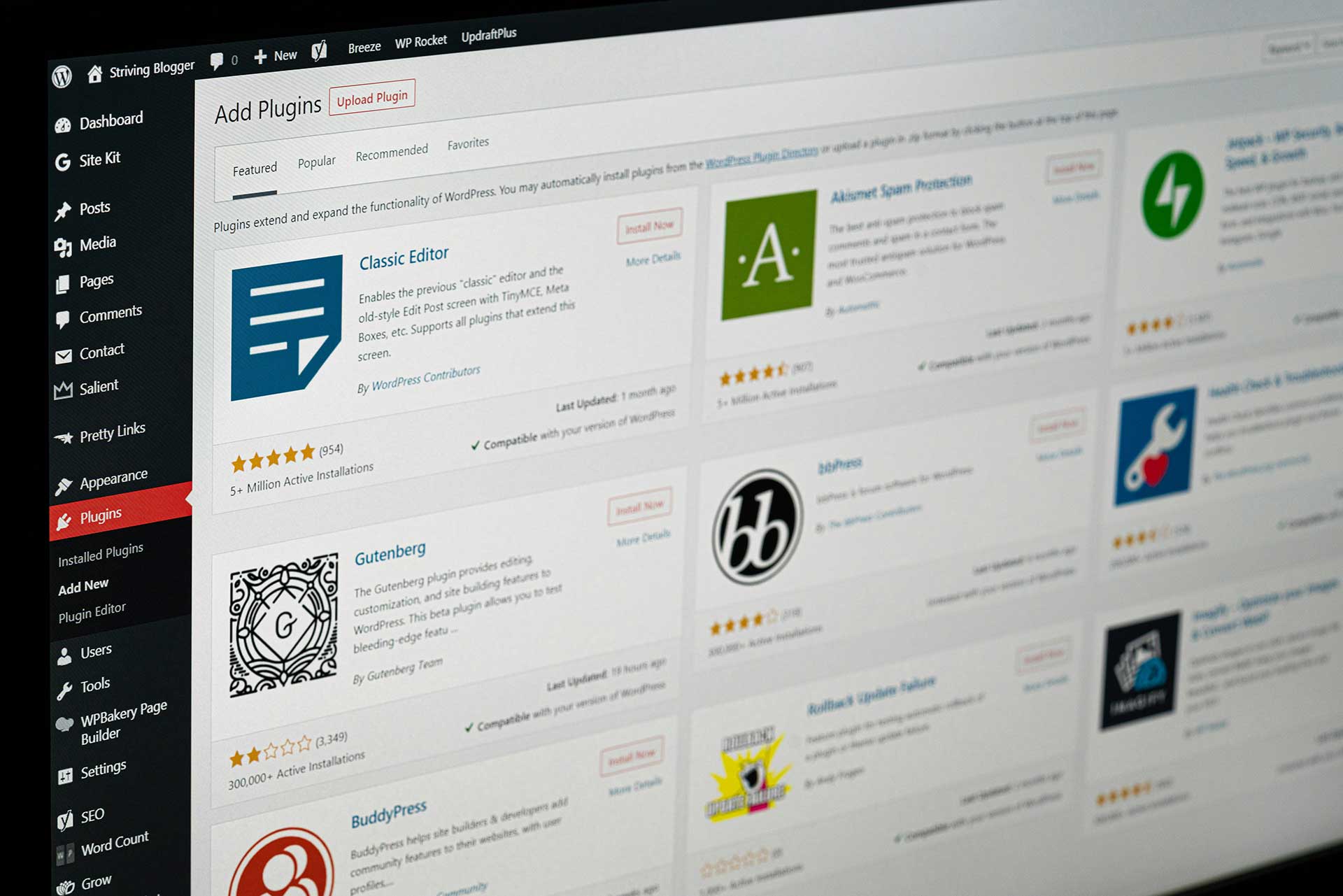WordPress powers more than 40% of all websites worldwide, making it the most popular CMS (Content Management System). One of the biggest reasons for this dominance is plugins.
Plugins are like apps for your WordPress site—they extend functionality, add features, and optimize performance without requiring you to write complex code. Whether you need an SEO boost, an e-commerce store, advanced security, or faster load times, plugins make it possible.
In this post, we’ll explore how WordPress plugins enhance website functionality, which plugins are essential for business growth, and best practices for choosing and managing them in 2025.
1. What Are WordPress Plugins?
A WordPress plugin is a piece of software that “plugs in” to your website, allowing you to add or enhance functionality. Think of them as building blocks that let you customize your site without starting from scratch.
From simple contact forms to complex e-commerce systems, plugins empower businesses of all sizes to create feature-rich websites.
2. Why Plugins Are Crucial in 2025
- Customization without coding – Non-developers can add features easily.
- Cost-effectiveness – Avoid paying for custom-built solutions.
- Scalability – Add features as your business grows.
- Faster development – Save time and focus on your business.
- Security updates – Reliable plugins are regularly updated to protect your site.
3. Enhancing SEO with Plugins
Search engine optimization is critical for visibility. SEO plugins like Yoast SEO or Rank Math allow you to:
- Optimize titles and meta descriptions
- Improve readability
- Create XML sitemaps
- Analyze keyword usage
- Add structured data (schema)
With the right plugin, even beginners can improve their site’s SEO without hiring an expert.
4. Improving Website Speed & Performance
Speed is a key ranking factor and user experience element. Plugins like:
- WP Rocket (caching and optimization)
- Autoptimize (minifies CSS/JS files)
- Smush (image compression)
- LiteSpeed Cache (advanced performance optimization)
These tools reduce page load times, making your website more responsive and search-engine friendly.
5. Strengthening Security
Cybersecurity is a growing concern in 2025. Security plugins such as:
- Wordfence Security
- Sucuri Security
- iThemes Security
help protect your site from malware, brute force attacks, and unauthorized logins. They also provide firewalls and activity monitoring.
6. Enhancing User Experience (UX)
Plugins improve UX design by adding:
- Contact Form 7 / WPForms – Simple, customizable contact forms
- Elementor / Beaver Builder – Drag-and-drop design builders
- MonsterInsights – Google Analytics integration for better user insights
- LiveChat / Tawk.to – Real-time chat support
All of these create smoother, more interactive websites.
7. E-commerce with Plugins
For businesses selling products online, plugins like WooCommerce are game changers. WooCommerce enables:
- Product catalog and management
- Secure payment gateways
- Inventory tracking
- Shipping integration
- Customer accounts and reviews
It essentially transforms your WordPress site into a fully functional online store.
8. Boosting Marketing Efforts
Marketing-focused plugins streamline outreach and engagement:
- Mailchimp for WordPress – Email marketing integration
- OptinMonster – Popups and lead capture
- Social Snap – Social media sharing
- AffiliateWP – Create and manage affiliate programs
These tools help expand reach and grow audiences efficiently.
9. Analytics and Tracking
Data-driven decisions improve websites. Analytics plugins such as:
- MonsterInsights (Google Analytics dashboard)
- ExactMetrics
- Hotjar (heatmaps and user behavior tracking)
allow you to understand how visitors interact with your site and optimize accordingly.
10. Multilingual and Global Reach
For international businesses, multilingual plugins like:
- WPML
- Polylang
help create websites in multiple languages, reaching broader audiences and improving engagement.
11. Accessibility Enhancements
Plugins like:
- WP Accessibility
- One Click Accessibility
ensure your site meets accessibility standards, making it usable by everyone, including people with disabilities.
12. Best Practices for Using Plugins
- Choose Trusted Plugins – Always install from reputable developers.
- Check Reviews and Ratings – Avoid poorly rated plugins.
- Keep Plugins Updated – Outdated plugins can cause security risks.
- Limit Plugin Count – Too many plugins can slow down your site.
- Test Before Installing – Use a staging site to test functionality.
- Backup Regularly – Use plugins like UpdraftPlus for backups.
13. WordPress Plugins and Business Growth
When used strategically, plugins:
- Save time and resources
- Enhance customer engagement
- Strengthen brand trust
- Increase conversions and revenue
- Provide scalability as businesses grow
This makes WordPress plugins vital tools for long-term success.
14. The Future of WordPress Plugins
In 2025 and beyond, we can expect plugins to become even more powerful:
- AI-driven plugins – Personalized recommendations and automation
- Voice-optimized plugins – Catering to smart speakers and voice search
- AR/VR plugins – Immersive shopping experiences
- Green plugins – Optimizing websites for eco-friendly hosting
Businesses that adopt these innovations early will maintain a competitive advantage.
WordPress plugins are the backbone of website functionality. They transform basic sites into powerful business platforms by enhancing SEO, speed, security, user experience, and marketing.
At DevsBloom, we specialize in building WordPress websites with the right plugins, ensuring your site is not only functional but also optimized for performance, conversions, and future growth.
Your website should work for you—not against you. With the right plugins, your WordPress site can bloom into a digital powerhouse. 🌸






